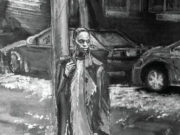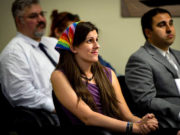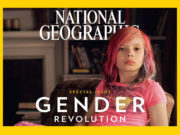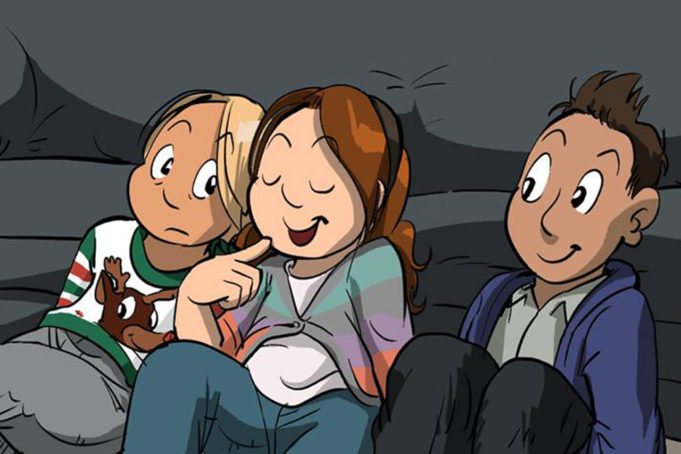*There is some confusion over the title of this article. Transgender Universe does not in any way imply that Ms Labelle is cross dressing in a literal sense; the title is a direct quote that was part of a running joke made by Labelle on the night. Miss Barnhurst used the quote to convey Ms Labelle’s wit – an ever present component of her talk that evening.
London, October 2nd, 2017 – The space was intimately arranged for what was designed to be a come-as-you-are question and answer discussion with cartoonist Sophie Labelle of Assigned Male. An informal atmosphere permeated the evening, with the artist relaxing around the space as people filtered in a few minutes before the start time of 6:30 PM. The event, hosted by Action For Trans Health London, was merrily facilitated by improvising charity workers; the lack of polish gave the evening a charming honesty.
Labelle started the evening with a relaxed, meandering description of how Assigned Male came about alongside a bit of her own journey as she ‘came out of the closet as a cartoonist’. Slouching in her chair, she effortlessly spun the story of her art as an expression of her transgender journey in a friendly, practised yet unrehearsed manner that she even joked about at one point, saying that her producer had heard all these jokes before.
“I just put two characters together and see what happens. I don’t know what is going to happen.”
The discussion moved on to Labelle’s writing: an organic, free flowing process. “I just put two characters together and see what happens. I don’t know what is going to happen,” but swiftly moved on to how there was no transmasculine equivalent of Assigned Male. “I have transmasculine characters in my comics, but they are mostly kept to supporting roles because I don’t feel I can convey that experience. I try to share transmasculine artists on my artist page, but I don’t know about any ‘assigned female’ type comic.”
Labelle had the most to say about language and how gender is treated from language to language – particularly her native French. “It’s impossible to speak without gender in French. It’s possible to misgender yourself, the person you’re speaking to, every object in this room. People will say to me how they managed to misgender themselves in their head.” Labelle also expressed with a mix of pride and shock that she’s helped create transgender terms in French because of her need to use them in her comics. Terms that anglophones take for granted such as deadname that previously had no French analogue.

Linguistic differences also translate into strong differences between the cultural responses Labelle gets for comics that are translated from one language to the next. “The French comments are full of these big long theories about gender and what it means – I don’t respond to the French comment page anymore. Even a small comment to someone will create this huge response. The English speakers are much more complimentary; they just say, ‘Good one Sophie.'”
Labelle mused after that the permeation of gender in the French language challenges Francophones in ways Anglophones aren’t. That we all have our experience but we have it in different ways and mentioned Finnish, with its lack of gendered pronouns or any other specific gender references, as an example of how the transgender experience can change wildly from one culture to another by dint of the language used to discuss it.
“I had a choice to either hide or write more. I wrote more because it pissed them off so much.”
A mixed relationship with opposition was a recurring theme of the evening. Labelle said several times that her haters were her biggest fans and attributed her fame to them – an ongoing Streisand Effect. She also discussed how it was her opposition that spurred her on the write more as an act of defiance while at the same time expressing frustration and sadness at the exhaustion and upset the negativity causes. “I started showing up on these TERF [transgender exclusionary radical feminist] websites, and others would check them, so they would discover me,” Labelle mentioned, “I had a choice to either hide or write more. I wrote more because it pissed them off so much. They’re my biggest fans. They can tell you every little thing about whatever strip from two years ago – I can’t do that.”

Despite being spurred on by her opponents, it was clear that the pressure of visibility was a struggle for Labelle. She discussed loose plans to end the strip in the next few years and move to predominantly printed media, citing there was less exposure in producing printed works. “That’s why my characters are getting older,” she said in response to the question of whether Assigned Male would come to an end, “I live in a big town but even wandering around outside I get people coming up to me saying, ‘You’re Sophie Labelle!’ or the more awkward, ‘Do you draw comics?'” Labelle expressed anger and frustration at her opponents as well and called for more legislation to make cyberbullying harder.
The accidental rise of this humble activist from Montréal is an inspiration for those who feel they have no voice. As she sat there casually discussing culture, language, art, and gender there was a humorous directness in her words. An experiential sharing that was poignant even as it was entertaining. A self awareness of fame that stripped the persona bare and showed the audience a woman that was genuinely glad to reach so many, even as she said she didn’t want to sustain that fame. A disbelief that anyone would listen that leant honesty to the exchange.
Perhaps that is what we can learn from Sophie Labelle: speak and be heard. You never know who will find you.
































